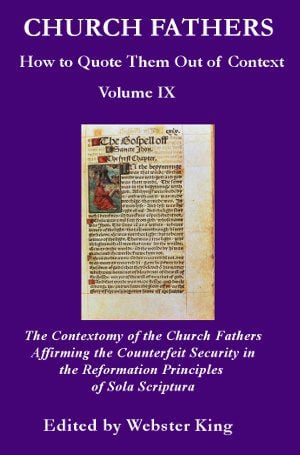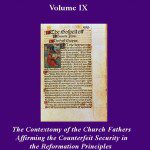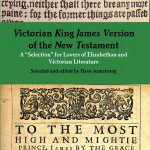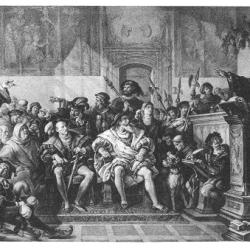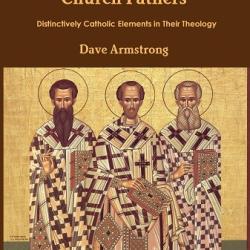In Vol. III, King and Webster provide us with a litany of Scripture-praising proclamations from St. Basil (329-379): none of which differ in the slightest from Catholic belief. In their section on material sufficiency (pp. 70-72), the following statements are found:
. . . we have determined . . . to avoid now and always every utterance and sentiment not found in the Lord’s teaching . . . our thoughts derive from the Scriptures . . . (Fathers of the Church, Vol. IX, Concerning Faith)
. . . what is in harmony with the Scriptures, what is not in opposition to the Fathers. (Homily 24, NPNF2)
Here even Webster and King include a passage that shows two legs of the Catholic “three-legged stool”: Scripture and the fathers (i.e., tradition). Good for them: they actually included (almost despite themselves) a passage about apostolic tradition (!!!).
. . . each one should learn that which is useful from the inspired Scripture . . . that he may not be accustomed to human traditions. (Regulae Brevius Tractate, Interrogatio et Responsio XCV; translation by William Goode, Vol. III, p. 132)
. . . fearing lest he should either speak or order anything beyond the will of God as declared in the Scriptures . . . (Ibid., XCVIII; Vol. III, p. 132)
. . . every word and deed should be ratified by the testimony of the Holy Scripture . . . (Fathers of the Church, Vol. IX, The Morals, Rule 26; cited again in Vol. III, 143-144)
. . . in conformity with the Scriptures and rejecting what is opposed to them . . . (Fathers of the Church, Vol. IX, The Morals, Rule 72, pp. 185-186; cited again in Vol. III, 144)
. . . everything outside Holy Scripture, not being of faith, is sin. (Fathers of the Church, Vol. IX, The Morals, Rule 80, Cap. 22, pp. 203-204)
. . . let God-inspired Scripture decide between us; and on whichever side be found doctrines in harmony with the word of God, in favour of that side will be cast the vote of truth. (Letter 189, NPNF2, Vol. VIII)
We have no beef with all this, so there is no need for further comment. We simply add that the fathers, including St. Basil, do not oppose Scripture to the binding authority of the Church and apostolic tradition: all are regarded as perfectly harmonious and complementary. Since Webster and King exclude the many references to such authority other than the Bible, it’s left to me to fill that gap and give the whole picture.
In their chapter three: “The Perspicuity of Scripture,” Webster and King provide some of St. Basil’s statements along those lines (pp. 185-186):
Enjoying as you do the consolation of the Holy Scriptures, you stand in need neither of my assistance nor of that of anybody else to help you comprehend your duty. You have the all-sufficient counsel and guidance of the Holy Spirit to lead you to what is right. (Letter 283; NPNF2, Vol. VIII)
It is this which those seem to me not to have understood, who, giving themselves up to the distorted meaning of allegory, have undertaken to give a majesty of their own invention to Scripture. It is to believe themselves wiser than the Holy Spirit, and to bring forth their own ideas under a pretext of exegesis. Let us hear Scripture as it has been written. (Hexaemeron, Homily 9: The Creation of Terrestrial Animals 1; NPNF2, Vol. VIII)
Note that allegory as a method of hermeneutics is not rejected (as many Protestants do, or largely do), but rather, “the distorted meaning of allegory.”
All Scripture is inspired by God and is useful, composed by the Spirit for this reason, namely, that we men, each and all of us, as if in a general hospital for souls, may select the remedy for his own condition. (Fathers of the Church, Vol. 46: Homily 17 on Psalm 44; p. 283)
More is offered in chapter four: “The Self-Interpreting Nature of Scripture” (p. 245 for Basil):
. . . let us obey the Lord who says: ‘Search the Scriptures.’ Let us follow the example of the Apostles who questioned the Lord Himself as top the interpretation of His words, and learn the true and salutary course from His words in another place. (Fathers of the Church, Vol. IX, Concerning Baptism, Book II, Q&R; 4, p. 399)
Whatsoever seems to be spoken ambiguously or obscurely in some places of holy Scripture, is cleared up by what is plain and evident in other places. (Regulae Brevius Tractate, Interrogatio 267; translation by William Whitaker, in his Disputation on Holy Scripture [Cambridge University Press: 1849, p. 491] )
And again in chapter six: “The Necessity for Diligent Personal Study of Scripture” (p. 287 for Basil) they cite the following:
The study of inspired Scripture is the chief way of finding our duty . . . (Letter 2 [3]; NPNF2, Vol. VIII)
Read your Bible carefully, and you will find the answer to your question there. (Letter 188; NPNF2, Vol. VIII; repeated on Webster and King’s p. 302)
. . . one who examines each word minutely can gain a very accurate knowledge of the meaning of the Holy Scripture, so that there is no excuse of any of us being led astray . . . (Fathers of the Church, Vol. IX, Preface on the Judgment of God, p. 48)
That gives us a thorough survey of St. Basil’s view of Scripture. No problem for Catholics here at all. But there is a huge problem for sola Scriptura Protestants, when we also look at what Basil wrote about tradition, including oral tradition, and the Church. So why don’t we take a few minutes to examine the whole picture now, rather than a slanted, one-sided presentation for polemical purposes, that deliberately ignores all of this other relevant data (which amounts — I would argue — to sophistry and half-truth).
Much of the following was documented in August 2003 during a debate on the same topic with ant-Catholic apologist Jason Engwer, (originally promoted and held in the anti-Catholic CARM forum: Jason split — with the obligatory insults — long before it was over: a rather common occurrence for anti-Catholics) and has been available on my website or blog ever since. Additional material comes from my recent book: The Quotable Eastern Church Fathers. None of this is “new stuff” for me; it’s “old ground.”
The new thing in this paper is to demonstrate how Webster and King are so absurdly hyper-selective in their presentation. It’s the game they play throughout their three-volume work, which is unworthy of any Christian who seeks to be honest about what the Church fathers taught, regardless of how consistent the results are with their own belief-system (while they accuse Catholics many times in the set of this same sort of historical dishonesty). Many Protestant scholars and historians routinely present the true facts (one need not be Catholic or Orthodox to be honest and truthful about patristic beliefs); but, sadly, anti-Catholic polemicists like Webster and King — who have a distinct agenda — do not.
To give just one example of an honest Protestant scholar, writing on our topic, J. N. D. Kelly — someone cited by Webster and King –, stated about St. Basil and tradition:
. . . Basil made the liturgical custom of baptizing in the threefold name a pivot in his argument for the coequality of the Spirit with Father and Son, pleading that the apostolic witness was conveyed to the Church in the mysteries as well as in Scripture, and that it was apostolic to abide by this unwritten tradition.
(Early Christian Doctrines, HarperSanFrancisco: revised edition of 1978, 45; footnotes to the primary work: The Holy Spirit, 26; 28; 66-67; 71)
Now, wouldn’t those passages in St. Basil the Great be relevant to the question of his views on authority and (supposedly his acceptance of) sola Scriptura? Certainly so; yet Webster and King deemed them not relevant enough to include in their “survey.” They wouldn’t fit with the plan, you see . . . The real Basil is so much a proponent of apostolic tradition that he says the enemies of the faith are those who want to destroy it:
The one aim of the whole band of opponents and enemies of “sound doctrine” is to shake down the foundation of the faith of Christ by levelling apostolic tradition with the ground, and utterly destroying it. (The Holy Spirit, 25; NPNF2-8)
He doesn’t pit Scripture and tradition and Church against each other at all, but rather, appeals to them all interchangeably (the Catholic “three-legged stool” of authority):
What our fathers said, the same say we, that the glory of the Father and of the Son is common; wherefore we offer the doxology to the Father with the Son. But we do not rest only on the fact that such is the tradition of the Fathers; for they too followed the sense of Scripture, and started from the evidence which, a few sentences back, I deduced from Scripture and laid before you. (The Holy Spirit, 16; NPNF2-8)
I was distressed to hear that over anti above the disturbance brought on the Churches by the Arians, and the confusion caused by them in the definition of the faith, there has appeared among you yet another innovation, throwing the brotherhood into great dejection, because, as you have informed me, certain persons are uttering, in the hearing of the faithful, novel and unfamiliar doctrines which they allege to be deduced from the teaching of Scripture . . . who has the hardihood now once again to renew by the help of sophistical arguments and, of course, by scriptural evidence, that old dogma of Valentinus, now long ago silenced? . . . These, brethren, are the mysteries of the Church; these are the traditions of the Fathers. Every man who fears the Lord, and is awaiting God’s judgment, I charge not to be carried away by various doctrines. If any one teaches a different doctrine, and refuses to accede to the sound words of the faith, rejecting the oracles of the Spirit, and making his own teaching of more authority than the lessons of the Gospels, of such an one beware . . . (Letter #261; NPNF2-8)
Basil was a strong advocate of even oral, or unwritten tradition (one would never know that, merely reading Webster and King, would they?):
Let us now investigate what are our common conceptions concerning the Spirit, as well those which have been gathered by us from Holy Scripture concerning It as those which we have received from the unwritten tradition of the Fathers. (The Holy Spirit, 22; NPNF2-8). . . they clamour for written proof, and reject as worthless the unwritten tradition of the Fathers. But we will not slacken in our defence of the truth. We will not cowardly abandon the cause. The Lord has delivered to us as a necessary and saving doctrine that the Holy Spirit is to be ranked with the Father. (The Holy Spirit, 25; NPNF2-8)Of the beliefs and practices whether generally accepted or publicly enjoined which are preserved in the Church some we possess derived from written teaching; others we have received delivered to us “in a mystery” by the tradition of the apostles; and both of these in relation to true religion have the same force. And these no one will gainsay;—no one, at all events, who is even moderately versed in the institutions of the Church. For were we to attempt to reject such customs as have no written authority, on the ground that the importance they possess is small, we should unintentionally injure the Gospel in its very vitals; or, rather, should make our public definition a mere phrase and nothing more. For instance, to take the first and most general example, who is thence who has taught us in writing to sign with the sign of the cross those who have trusted in the name of our Lord Jesus Christ? What writing has taught us to turn to the East at the prayer? Which of the saints has left us in writing the words of the invocation at the displaying of the bread of the Eucharist and the cup of blessing? For we are not, as is well known, content with what the apostle or the Gospel has recorded, but both in preface and conclusion we add other words as being of great importance to the validity of the ministry, and these we derive from unwritten teaching. Moreover we bless the water of baptism and the oil of the chrism, and besides this the catechumen who is being baptized. On what written authority do we do this? Is not our authority silent and mystical tradition? Nay, by what written word is the anointing of oil itself taught? And whence comes the custom of baptizing thrice? And as to the other customs of baptism from what Scripture do we derive the renunciation of Satan and his angels? Does not this come from that unpublished and secret teaching which our fathers guarded in a silence out of the reach of curious meddling and inquisitive investigation? Well had they learnt the lesson that the awful dignity of the mysteries is best preserved by silence. What the uninitiated are not even allowed to look at was hardly likely to be publicly paraded about in written documents. . . . the Apostles and Fathers who laid down laws for the Church from the beginning thus guarded the awful dignity of the mysteries in secrecy and silence, for what is bruited abroad random among the common folk is no mystery at all. This is the reason for our tradition of unwritten precepts and practices, that the knowledge of our dogmas may not become neglected and contemned by the multitude through familiarity. . . . Time will fail me if I attempt to recount the unwritten mysteries of the Church. Of the rest I say nothing; but of the very confession of our faith in Father, Son, and Holy Ghost, what is the written source? If it be granted that, as we are baptized, so also under the obligation to believe, we make our confession in like terms as our baptism, in accordance with the tradition of our baptism and in conformity with the principles of true religion, let our opponents grant us too the right to be as consistent in our ascription of glory as in our confession of faith. If they deprecate our doxology on the ground that it lacks written authority, let them give us the written evidence for the confession of our faith and the other matters which we have enumerated. While the unwritten traditions are so many, and their bearing on “the mystery of godliness” is so important, can they refuse to allow us a single word which has come down to us from the Fathers;—which we found, derived from untutored custom, abiding in unperverted churches;—a word for which the arguments are strong, and which contributes in no small degree to the completeness of the force of the mystery? (The Holy Spirit, 66-67; NPNF2-8)In answer to the objection that the doxology in the form “with the Spirit” has no written authority, we maintain that if there is no other instance of that which is unwritten, then this must not be received. But if the greater number of our mysteries are admitted into our constitution without written authority, then, in company with the many others, let us receive this one. For I hold it apostolic to abide also by the unwritten traditions. “I praise you,” it is said, “that ye remember me in all things, and keep the ordinances as I delivered them to you;” and “Hold fast the traditions which ye have been taught whether by word, or our Epistle.” One of these traditions is the practice which is now before us, which they who ordained from the beginning, rooted firmly in the churches, delivering it to their successors, and its use through long custom advances pace by pace with time. If, as in a Court of Law, we were at a loss for documentary evidence, but were able to bring before you a large number of witnesses, would you not give your vote for our acquittal? I think so; for “at the mouth of two or three witnesses shall the matter be established.” And if we could prove clearly to you that a long period of time was in our favour, should we not have seemed to you to urge with reason that this suit ought not to be brought into court against us? For ancient dogmas inspire a certain sense of awe, venerable as they are with a hoary antiquity. I will therefore give you a list of the supporters of the word (and the time too must be taken into account in relation to what passes unquestioned). For it did not originate with us. How could it? We, in comparison with the time during which this word has been in vogue, are, to use the words of Job, “but of yesterday.” I myself, if I must speak of what concerns me individually, cherish this phrase as a legacy left me by my fathers. It was delivered to me by one who spent a long life in the service of God, and by him I was both baptized, and admitted to the ministry of the church. (The Holy Spirit, 71; NPNF2-8)
. . . we too are undismayed at the cloud of our enemies, and, resting our hope on the aid of the Spirit, have, with all boldness, proclaimed the truth. Had I not so done, it would truly have been terrible that the blasphemers of the Spirit should so easily be emboldened in their attack upon true religion, and that we, with so mighty an ally and supporter at our side, should shrink from the service of that doctrine, which by the tradition of the Fathers has been preserved by an unbroken sequence of memory to our own day. (The Holy Spirit, 79; NPNF2-8)
In our case, too, in addition to the open attack of the heretics, the Churches are reduced to utter helplessness by the war raging among those who are supposed to be orthodox. For all these reasons we do indeed desire your help, that, for the future all who confess the apostolic faith may put an end to the schisms which they have unhappily devised, and be reduced for the future to the authority of the Church; that so, once more, the body of Christ may be complete, restored to integrity with all its members. Thus we shall not only praise the blessings of others, which is all we can do now, but see our own Churches once more restored to their pristine boast of orthodoxy. For, truly, the boon given you by the Lord is fit subject for the highest congratulation, your power of discernment between the spurious and the genuine and pure, and your preaching the faith of the Fathers without any dissimulation. That faith we have received; that faith we know is stamped with the marks of the Apostles; to that faith we assent, as well as to all that was canonically and lawfully promulgated in the Synodical Letter. (Letter #92 to the Italians and Gauls, 3; NPNF2-8)
Did it not at one time appear that the Arian schism, after its separation into a sect opposed to the Church of God, stood itself alone in hostile array? But when the attitude of our foes against us was changed from one of long standing and bitter strife to one of open warfare, then, as is well known, the war was split up in more ways than I can tell into many subdivisions, so that all men were stirred to a state of inveterate hatred alike by common party spirit and individual suspicion. But what storm at sea was ever so fierce and wild as this tempest of the Churches? In it every landmark of the Fathers has been moved; every foundation, every bulwark of opinion has been shaken: everything buoyed up on the unsound is dashed about and shaken down. (The Holy Spirit, 77; NPNF2-8)
. . . maintain for the true Church its famous orthodoxy . . . (Letter #47 to Gregory; NPNF2-8)
. . . the same Fathers who once at Nicæa promulgated their great decree concerning the faith. Of this, some portions are universally accepted without cavil, but the homoousion, ill received in certain quarters, is still rejected by some. . . . To refuse to follow the Fathers, not holding their declaration of more authority than one’s own opinion, is conduct worthy of blame, as being brimful of self-sufficiency. (Letter #52 to the Canonicae; NPNF2-8). . . you should confess the faith put forth by our Fathers once assembled at Nicæa, that you should not omit any one of its propositions, but bear in mind that the three hundred and eighteen who met together without strife did not speak without the operation of the Holy Ghost, . . . (Letter #114 to Cyriacus, at Tarsus; NPNF2-8)
It has seemed to me to be desirable to send a letter to the bishop of Rome, begging him to examine our condition, and since there are difficulties in the way of representatives being sent from the West by a general synodical decree, to advise him to exercise his own personal authority in the matter by choosing suitable persons to sustain the labours of a journey,—suitable, too, by gentleness and firmness of character, to correct the unruly among us here; . . . ( Letter #69 to St. Athanasius, 1-2; NPNF2-8)To renew laws of ancient love, and once again to restore to vigorous life that heavenly and saving gift of Christ which in course of time has withered away, the peace, I mean, of the Fathers, is a labour necessary indeed and profitable to me, but pleasant too, as I am sure it will seem to your Christ-loving disposition. For what could be more delightful than to behold all, who are separated by distances so vast, bound together by the union effected by love into one harmony of members in Christ’s body? Nearly all the East (I include under this name all the regions from Illyricum to Egypt) is being agitated, right honourable father, by a terrible storm and tempest. The old heresy, sown by Arius the enemy of the truth, has now boldly and unblushingly reappeared. Like some sour root, it is producing its deadly fruit and is prevailing. The reason of this is, that in every district the champions of right doctrine have been exiled from their Churches by calumny and outrage, and the control of affairs has been handed over to men who are leading captive the souls of the simpler brethren. I have looked upon the visit of your mercifulness as the only possible solution of our difficulties. Ever in the past I have been consoled by your extraordinary affection; and for a short time my heart was cheered by the gratifying report that we shall be visited by you. But, as I was disappointed, I have been constrained to beseech you by letter to be moved to help us, and to send some of those, who are like minded with us, either to conciliate the dissentient and bring back the Churches of God into friendly union, or at all events to make you see more plainly who are responsible for the unsettled state in which we are, that it may be obvious to you for the future with whom it befits you to be in communion. In this I am by no means making any novel request, but am only asking what has been customary in the case of men who, before our own day, were blessed and dear to God, and conspicuously in your own case. For I well remember learning from the answers made by our fathers when asked, and from documents still preserved among us, that the illustrious and blessed bishop Dionysius, conspicuous in your see as well for soundness of faith as for all other virtues, visited by letter my Church of Cæsarea, and by letter exhorted our fathers, and sent men to ransom our brethren from captivity. But now our condition is yet more painful and gloomy and needs more careful treatment. We are lamenting no mere overthrow of earthly buildings, but the capture of Churches; what we see before us is no mere bodily slavery, but a carrying away of souls into captivity, perpetrated day by day by the champions of heresy. Should you not, even now, be moved to succour us, ere long all will have fallen under the dominion of the heresy, and you will find none left to whom you may hold out your hand. (Letter #70 to Pope Damasus [complete]; NPNF2-8)


